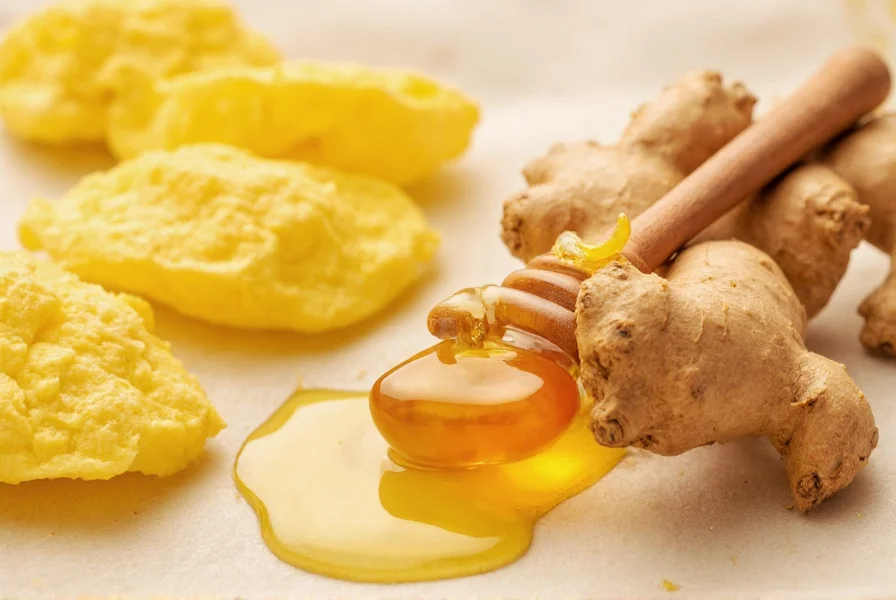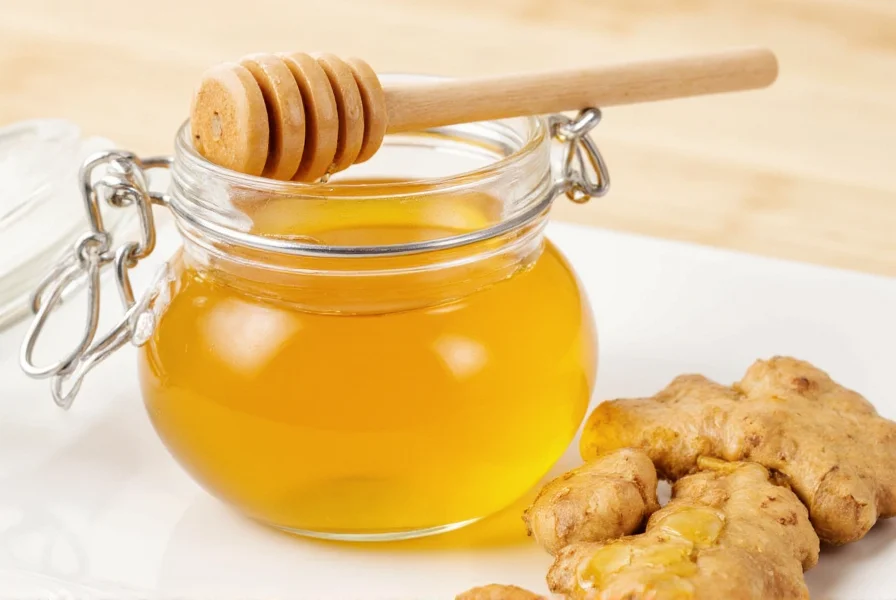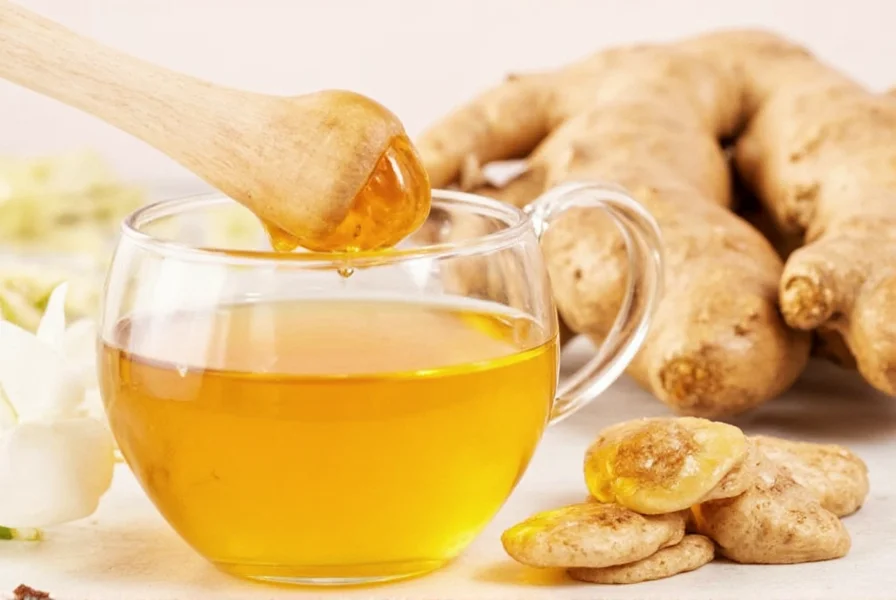For centuries, cultures worldwide have valued the health benefits of ginger and honey as a natural remedy combination. Modern research increasingly validates these traditional uses while revealing the specific mechanisms behind their effectiveness. This article examines the scientific evidence supporting ginger and honey applications, proper preparation methods, and important safety considerations.
The Science Behind Ginger's Therapeutic Properties
Ginger (Zingiber officinale) contains bioactive compounds, primarily gingerol, which gives it distinctive flavor and medicinal properties. Clinical studies demonstrate ginger's effectiveness for:
- Reducing nausea and vomiting, particularly during pregnancy and chemotherapy
- Alleviating osteoarthritis pain through anti-inflammatory action
- Improving digestion by accelerating gastric emptying
- Lowering blood sugar levels in type 2 diabetes management
A 2020 meta-analysis published in Nutrients confirmed ginger's significant anti-nausea effects, with doses of 1-1.5 grams daily showing consistent results. The compound 6-gingerol specifically inhibits serotonin receptors involved in nausea pathways.
Honey's Bioactive Components and Health Effects
Raw, unprocessed honey contains over 200 bioactive compounds including:
- Polyphenols with antioxidant properties
- Hydrogen peroxide produced by glucose oxidase enzyme
- Methylglyoxal (MGO) in manuka honey with potent antibacterial effects
- Prebiotic oligosaccharides supporting gut microbiome
| Honey Type | Key Active Compounds | Primary Health Benefits |
|---|---|---|
| Raw Wildflower | Polyphenols, flavonoids | General antioxidant support, immune modulation |
| Manuka (UMF 10+) | Methylglyoxal (MGO) | Antibacterial action, wound healing |
| Acacia | Low glucose, high fructose | Gentle on blood sugar, digestive soothing |
Research in the Journal of Functional Foods (2022) demonstrated honey's effectiveness as a cough suppressant, outperforming placebo and matching some over-the-counter medications for nighttime cough relief in children over age one.
Synergistic Effects of Ginger and Honey Combination
When combined, ginger and honey create complementary effects that enhance their individual benefits:
The ginger honey remedy for cold symptoms works through multiple mechanisms. Ginger's anti-inflammatory properties reduce airway inflammation while honey coats irritated mucous membranes. A 2021 clinical trial found that participants using ginger-honey syrup reported 32% greater symptom relief compared to honey alone for upper respiratory infections.
For digestive health, this combination addresses multiple pathways. Ginger stimulates digestive enzymes and gut motility, while honey's prebiotic compounds nourish beneficial gut bacteria. This makes ginger and honey for digestion particularly effective after heavy meals or during digestive upset.
Traditional Preparations and Modern Applications
Various cultures have developed specific methods for preparing ginger honey mixture benefits. The most scientifically supported preparation involves:
- Peeling and thinly slicing 100g fresh ginger root
- Combining with 250ml raw honey in sterilized glass jar
- Allowing mixture to macerate at room temperature for 14 days
- Stirring daily to release ginger compounds into honey
This preparation creates a shelf-stable remedy where honey preserves ginger's active compounds while extracting them effectively. The resulting ginger honey tea can be made by adding 1-2 teaspoons to warm (not boiling) water to preserve enzymatic activity.

Safety Considerations and Contraindications
While generally safe, certain populations should exercise caution with ginger and honey:
- Infants under 12 months should never consume honey due to botulism risk
- Individuals taking blood thinners should consult doctors before regular ginger consumption
- Those with gallstone disease may experience increased bile production
- Diabetics should monitor blood sugar as honey contains natural sugars
The recommended daily intake for adults is 3-4 grams of ginger (about 1 teaspoon powder or 1 inch fresh root) combined with 1-2 tablespoons of honey. Excessive consumption may cause heartburn or digestive discomfort in sensitive individuals.
Evidence-Based Usage Recommendations
Based on current research, here's how to maximize the natural remedies with ginger and honey:
- For respiratory relief: Take 1 teaspoon of ginger-honey mixture every 2-3 hours during acute symptoms
- For digestive support: Consume 1 teaspoon 15 minutes before meals
- As immune support: Take 1 teaspoon daily during cold and flu season
- For nausea prevention: Consume 30 minutes before potential triggers
Remember that while these ginger and honey benefits are supported by research, they complement rather than replace medical treatment for serious conditions. Always consult healthcare providers for persistent symptoms.

Conclusion
The combination of ginger and honey represents a powerful natural remedy with growing scientific validation. While traditional uses have existed for millennia, modern research continues to uncover the specific mechanisms behind their effectiveness. When prepared properly and used appropriately, this simple combination offers accessible support for common health concerns without pharmaceutical side effects. As with any natural remedy, understanding both the evidence-based benefits and limitations ensures safe, effective use.
Frequently Asked Questions
How long does ginger honey mixture last?
Properly prepared ginger honey mixture stored in a sterilized glass jar at room temperature maintains potency for 2-3 months. Refrigeration extends shelf life to 6 months. The honey preserves the ginger, but separation may occur - simply stir before use. Discard if mold appears or fermentation begins.
Can ginger and honey help with weight loss?
While ginger may modestly support metabolism and satiety, and honey can satisfy sweet cravings healthily, neither directly causes significant weight loss. Research shows ginger may increase thermogenesis slightly, but sustainable weight management requires comprehensive dietary and lifestyle changes. Using ginger honey as a replacement for refined sugar can support healthier eating patterns.
Is ginger honey safe during pregnancy?
Ginger is generally considered safe during pregnancy for nausea relief (up to 1 gram daily), but honey should be avoided during the first trimester due to potential botulism spores. After the first trimester, pasteurized honey is typically safe. Always consult your healthcare provider before using any remedy during pregnancy, especially if you have gestational diabetes or other complications.
What's the best way to make ginger honey tea?
For optimal benefits, add 1-2 teaspoons of prepared ginger honey mixture to water heated to 160-170°F (70-77°C) - not boiling, which destroys beneficial enzymes in honey. Steep for 5-7 minutes. Adding lemon enhances vitamin C absorption. Avoid microwave heating, which reduces honey's beneficial properties. Drink 2-3 times daily when needed for symptom relief.
Does ginger honey help with acid reflux?
Ginger may help some people with mild acid reflux by improving gastric motility, but can worsen symptoms in others due to its spicy nature. Honey's soothing properties may counteract this for some individuals. Research shows mixed results - a 2019 study found ginger helpful for functional dyspepsia but not GERD. If you have chronic acid reflux, consult a healthcare provider before using ginger remedies regularly.











 浙公网安备
33010002000092号
浙公网安备
33010002000092号 浙B2-20120091-4
浙B2-20120091-4